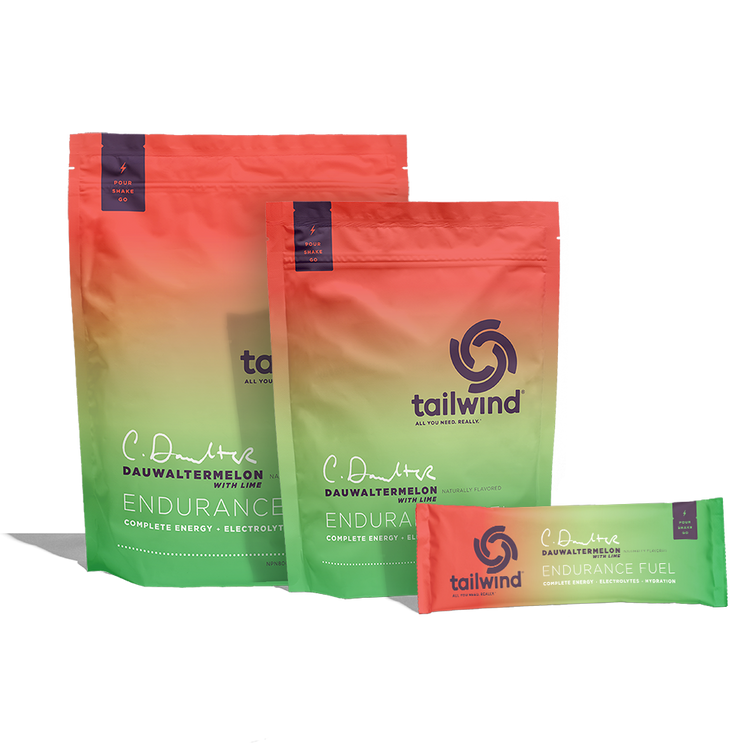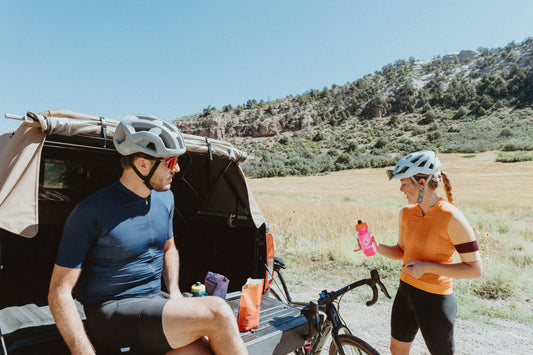10 Things I Wish I Knew for My First Triathlon
0 Comments
Tailwind athlete Justin Kaufmann has raced 1 full and 4 half Ironman races. As he looks towards his next full Ironman, we wanted him to share some advice for those training for their first triathlon!
1. Be patient, it’s hard, but gets easier.
There’s no secret behind it, trying to master three sports at once isn’t easy. As an athlete competing in bodybuilding, I always thought training was easy until I made the transition into ironman training. Swimming, biking, running and doing strength workouts is not only time consuming, but also very hard. Each sport demands different techniques along with hours of practice in order to master each one. There’s no running before you walk in each sport, you have to have the patience to build up endurance, stamina and certain strength in all three sports. Allow your body to make the physical and mental adaptation prior to choosing any race that fits your needs.
2. Time - make sure you have it!
Something we can never take back is time. From the second I woke up, to the moment I went to bed my body was wired for the Ironman. I never factored in how much time training, eating and sleeping actually took. A two hour run isn’t a two hour run, you have to factor in pre/post stretching, showering, eating and then continuing your day. Now, imagine your 6/7 hour brick workouts every Saturday!
3. Know how to fuel.
One of the most important things needed for any human to survive, let alone train! Something I’ve struggled with my entire life has been eating. As athletes, I think there’s a fine line between looking good and fueling. We sometimes restrict in order to fit a certain look, however, you don’t get rewarded for looking good when you cross the finish line. Restricting carbs only set me up for poor workouts, awful recovery and moody hunger. Something I wish I knew early was my nutrition, how many calories, carbs, protein and fat I need in order to properly recover and train.
Transitioning into triathlon, your body will rely on carbs as its main source of fuel. Coming from a Keto background, I had a rough time transitioning my body over. After tons of trial and error, I was lucky enough to find Tailwind and their Endurance Fuel that offers 25g of fast carbs per scoop. It’s light, tastes amazing and is easily digested into your body which allows you to operate at the best of hour ability during training and races.
4. Focus on good sleep!
Be a baby, yes...a baby! After long workouts your body will need to handle the stress, along with recovery and also deal with whatever life throws at you. I thought I could function off 4/6 hours of sleep but sadly, I was wrong. After studying various triathletes, Kenya runners and high functioning athletes, I soon realized my sweet spot was around 8/10. What we consider a rest day (still getting up early, hitting the beach, shopping, hiking etc) is still taxing your body. Sleep will allow your body to reset your central nervous system, truly rest and recover in order to be at 100% to train the next day.
5. You have to pay to play!
Remember, you have three sports in one, which means three expenses. Going into my first triathlon I thought things such as bike tires, shoes and tri suits were cheap...wrong! Depending on your training, you're going to need multiple sets of tires, shoes, tri suits etc.
Make sure to set aside a budget that you’re comfortable spending.
6. It’s okay to reward yourself!
Who says training always has to be strict? Create a reward system for yourself. Think about little things you can do to treat yourself. It can be simple things; the rewards don’t have to be too fancy or substantial.
Whether it’s watching your favorite show, listening to your favorite album or podcast, getting a foot massage from your partner, taking a bath, or any other activity you enjoy – the idea is to pair that particular pleasant experience with your training.
It may seem a bit silly, but science has found positive reinforcement to be highly effective in increasing motivation. Think about it, who wants to train 4 hours Friday, Sunday without any reward? I’ve found that I would burn out towards the middle and end of my training because I wasn’t allowing myself to have fun, or let alone look forward to things during or after my workout.
7. Train your mind with meditation.
The mental aspects of your training are just as important as the physical ones. Your body will give up at some point during an Ironman, maybe around the 6/7 hour mark. So, where does your mind take you?
No matter how much strength or endurance you build in the body, it’s not going to matter if you don’t have a healthy mindset to support it.
Meditation is training for the mind. There are many types of meditation, so if one particular method doesn’t jive with your personality, try something different.
Meditation is beneficial to your triathlon training in a number of ways:
- Helping you get better, more restorative sleep
- Improving focus and concentration
- Allowing you to live more in the moment
- Positively impacting your breathing
- Helping you better regulate your emotions
- Lowering your anxiety, stress levels
However you decide to embark on your meditation practice, it’s going to be beneficial to your life in multiple ways.
8. Find a coach!
Embarking on any type of long-distance training means first coming up with a detailed planned that’s going to reach your goals. Finding a coach that you can vibe with, has future race success and cares about your training will allow you to be the best athlete you can. Remember, you don’t go into a drivers test without practicing with mom and dad before.
Everyone’s plan is going to be a little different, and you have to find what works for you. There is no shortage of detailed training routines out there to draw from, but tailoring them to your specific strengths and weaknesses will make your plan that much more effective.
9. Enjoy your post race.
Take it from me. I was running off the biggest high, and my first day after the Ironman I was back on the course running a 5K for time. I didn’t take a day off for the first 7 weeks, or even rewarded myself. That constant high and pushing after taxing my body lead me to a serious post race depression that took two months to get away from.
One mistake that a lot of first-time Ironman competitors make is to let the high following a race get the better of them. There’s no need to sign up for your next race the moment you finish your first. Take a break to unwind.
It’s important to have a detailed plan for how you’re going to care for yourself the night after the race, as well as the following week. What is your diet going to look like? What about your exercise routine?
The best way to make smart decisions is to make them in advance. The bottom line is: don’t do anything crazy right after your race. Avoid making any major life decisions.
10. Take it slow, stay healthy!
Some new triathletes are trying to be finely-tuned athletes, applying their previous training and discipline to a new sport. Others are simply trying to find a way to get back in shape, and have fun doing it. Maybe others have “do a triathlon” on their bucket list and want to do just one, and then move on to the next thing. Regardless of where you fall on the spectrum, know one thing: The name of the game is to train safely and not get injured. During the first couple years of doing tris when I adopted the sport with vigor, I found myself getting hurt far too often. Tight hamstrings, IT Band issues, and a shoulder that was telling me my swim stroke was off. I had to fundamentally adjust my training, because if you are not able to compete in races, it doesn’t matter how fast you are becoming. The lesson: Ramp-up your training gradually, stretch, and pay attention to your body. Goal #1 is to be able to race. Racing faster is great, but doing so requires you to be healthy.
Follow Along with Justin’s Training
You can follow along for more tips and training on Justin Kaufmann’s Instagram here. If you have fueling questions for Tailwind, reach out at supportcrew@tailwindnutrition.com!




